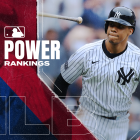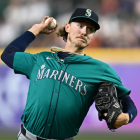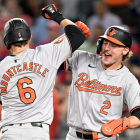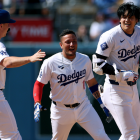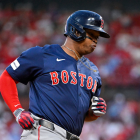I believe Barry Bonds' steroids story, even if it technically isn't the story he is telling.
Bonds, for the record, doesn't say much at all about steroids, and when he was under oath he said he didn't knowingly take steroids.
So no, I don't really believe that story. But I do believe the story that's out there that Bonds was one of the greatest clean players ever long before he became the greatest dirty player anyone could ever be.
No doubt about it, Bonds stands out -- he is quite likely both the best player and the best cheater most of us will ever see.
For four years now we Hall of Fame voters have stared at that big name on the ballot, and many of us don't know what to do. For the first three years he appeared, I stared at it, and stared some more. But I just couldn't do it. I couldn't bring myself to vote for the superstar player who turned himself into the greatest player any of us has ever seen, thanks to the aid of mad scientist Victor Conte, loyal trainer Greg Anderson and various chemicals.
But somehow, I always figured I couldn't say no forever to a player who was an all-time great very likely before he ever touched the bad stuff that would make him a better Babe Ruth, easily the greatest offensive force since baseball integrated. While I never before have voted for a player so inextricably linked to the juice (or linked at all for that matter), I always promised to take every player on the ballot case by case.
In this case, after much deliberation, for the first time I checked "yes" for Bonds. Every player has his own story. And Bonds' story is compelling, even if it isn't exactly the story he's always told.
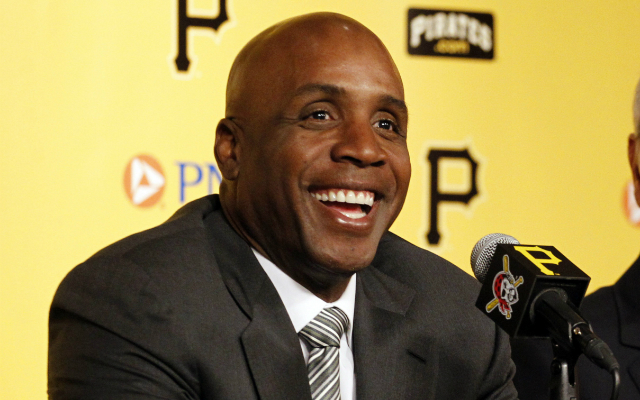
Though we can't be 100 percent sure of much that went on in the steroid era, the story I'm buying is the one where Bonds is the best player in the game, then saw very good players like Mark McGwire and Sammy Sosa pass by him after loading up and beefing up. Bonds, being the competitive sort, just couldn't stand to see lesser players so easily pass him by.
So he did it bigger, and better, and he soon turned himself superhuman. And his storied career became even more storied. (Coincidental aside: the word storied can be rearranged to become steroid.)
At least that's the narrative I believe today.
And if someone else tells me they don't believe that or can't vote for him, I understand that, too.
The Hall of Fame actually lists three of six criteria on the ballot as integrity, sportsmanship and character, so if someone wants to rule out the steroid guys forever, I get it. Let me repeat that, that's three of the six. You don't have to be a sabremetrics expert to understand that's 50 percent. And I don't discount that.
The steroid users and abusers grabbed for themselves more glory, more hardware and, not unimportantly, more moolah. So if someone wants to even out the score, I get it.
But for me, the issue generally has been more about the authenticity of a player's achievements, not the morality behind it (though I don't discount morals entirely). Are the numbers real? Would the player have been a Hall of Famer even without the help?
Bonds, I believe, was clean during his early years in Pittsburgh, and clean, too during his mid-career when he got home to San Francisco, clean up until the point where he was surpassed by several far lesser players (for the record, everyone was lesser).
It wasn't until his late career when his cap size and body grew -- Baseball Reference still lists him as 185 pounds, a reminder of what a svelte Pirate he was -- and they grew to mythical proportions. More to the point, his stats grew, too.
By the time the transformation started occurring around 1999, though, Bonds was already a Hall of Famer, at least in my estimation. And by now, after three "no" votes by me, and three disappointments for him, I figure it is time we recognize that he belongs in Cooperstown, late transgressions and all. He is an all-time great, and the Hall seems not quite complete without him.
I'm also figuring, if he gets in -- and it seems likely he's still years away, at the very least -- he won't be the first imperfect person so honored at Cooperstown. And maybe not even this year.
As imperfect as people are, so is this process now. We all knew it involved judgments. But now the judgments can be about who took what when, and how much it helped. The whole shebang is, in a word, a mess. (And writers can partly blame themselves for doing a poor job of journalism, for either looking the other way or being too dumb to notice for a decade, or more.)
I should confess, too, that I didn't like the Hall of Fame arbitrarily deciding and declaring that candidates no longer get 15 years on the ballot, and now get only 10. This I believe was a fairly transparent attempt to keep Bonds, Roger Clemens and the others like them out, and also to very likely satisfy a majority of the greats who are already in. Changing the rules in mid-stream seems to me to be a somewhat more benign form of cheating. That is, unless you are someone like the deserving and untainted Tim Raines, who is gaining support but suddenly now has five fewer years; in that case, this mid-game rule change isn't benign at all. While this isn't the reason I switched now on Bonds, it certainly made me start to think more about it.
I wasn't necessarily all that happy to vote "yes" on Bonds. It's just that I would have been even less happy to vote "no."
I know, I know. This isn't a perfect solution, and mine won't be judged a perfect ballot. Judgments are still being made about who took steroids, and even how effective they were. Case by case is anything but clean. It will be judged unfair by some, but it's fairer than other ways in my estimation.
I find it funny when voices on the Internet -- almost invariably stat guys and often folks who only cover the game from a distance -- declare which ballots are "strong" or stupid. Invariably, they like the ones filled with 'roid guys because oftentimes those are the guys with the numbers. And numbers people may not want to think that the numbers aren't always what they're cracked up to be. So to them, it all counts the same.
I'm not sure why the guys who support the cheaters seem so much more sure of themselves, or their votes. But I actually have great admiration for the holdouts, guys like Tom Verducci of Sports Illustrated, Scott Miller of Bleacher Report and Pedro Gomez of ESPN, guys who have ruled out players who have cheated their opponents, and also cheated the game. These are reporters who are willing to take the abuse from the loud and shallow guys on Twitter.
It's much easier to go strictly on stats, of course. And it's much harder to stand up in the face of a social media maelstrom.
It's hard, too, to say exactly how much the 'roids helped, of course. But there's no arguing that they didn't help. Not anymore. And there's no arguing it was cheating, and they all knew it was so. Certainly, you can't make the argument otherwise today.
We aren't just robots or calculators. We are judging history. And they tried to cheat history. But we should try to be as fair as we can.
As of today, I think it's fair Bonds gets a "yes" vote. I am going case by case, and he's an exception. He may not be the only exception, but he is the first exception.
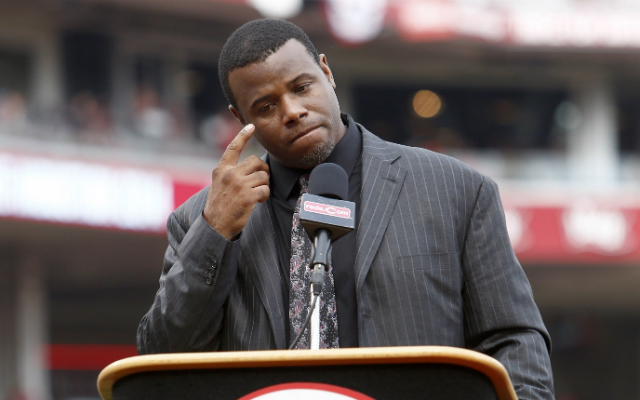
The ballot (with vote percentage predictions):
1. Ken Griffey. There's at least some case, however weak, to be made against every other player on this ballot. There is no case to be made against The Kid, who had 630 home runs and 10 Gold Gloves. The Seattle years were wondrous; 10 straight All-Star appearances and six years with 40-plus homers among them. Considering the new purposeful weeding out by the Hall of some 150 of the older writers who seemed more apt to be over-the-top tough (some might say, out of touch), he could set a record for highest percentage ever. Prediction: 99 percent. (elected)
2. Tim Raines. He's the second-greatest leadoff hitter over the last 40 years, and there's no shame in not quite being Rickey Henderson. There's a lot to recommend here, but you have to like that 84.7 percent stolen base percentage, and especially that .385 on-base percentage. It's a surprise he still got only 55 percent of the vote last year, and even less than that every preceding year. I give Jonah Keri credit for carrying the torch. He is right. There is no good reason Raines isn't in the Hall. Prediction: 66 percent.
3. Curt Schilling. You may not like him personally (you probably don't; I once had a relative of his send me multiple emails telling me how he ruined Thanksgiving -- not kidding), and his career totals may not blow you away, but three times he finished second in the Cy Young, three times he struck out 300, and, most importantly, three times he helped a team win a World Series title. Bloody sock or not, he belongs. Prediction: 48 percent.
4. Trevor Hoffman. He was the NL version of Mariano Rivera, though he obviously didn't have nearly the same postseason chances or success. It may take him a time more or two, but he should get in. Prediction: 64 percent.
5. Alan Trammell. He had close to the same career as Barry Larkin (according to Baseball Refernce, Larkin was the most similar batter through Trammell's age 38, though career-wise Larkin beat him handily in stolen bases, 379 to 236, and OPS, .815 to .767), and Larkin was seen as pretty close to a slam dunk. Better than the raw numbers, and he belongs, but he's not going to make it on his final try. Prediction: 41 percent.
6. Fred McGriff. A consistent offensive force (he hit 493 home runs clean without ever hitting more than 37 in a season) who was brilliant in October (.917 postseason OPS, higher than his .886 regular-year mark) and is yet somehow is consistently overlooked at this time of year. Prediction: 11 percent.
7. Bonds. Pre-steroids, he was one of the five greatest players of the last 50 years. After he partook, no one was close. Not that it matters, but the 2004 season is not even something Ruth could imagine: 212 OPS+, 1.422 OPS, 120 IBB, .609 OBP. Even eliminating the last nine years of his career, he was still one of the best ever. Prediction: 48 percent.
8. Mike Mussina. I have read the arguments, and I am a convert. The 3.57 ERA doesn't look great, but remember that he pitched only in the lethal AL East, and only in the steroid era. It looks better as an ERA+ of 123, which accounts for park and league and is actually a bit higher than Hall of Famer Tom Glavine's 118. His 83 WAR tops Glavine's 81.4 and also Nolan Ryan's 81.8 (though he obviously isn't Ryan -- WAR isn't perfect for the Hall of Fame). Eight times he finished in the top six in the Cy Young award (some may rip Cy votes as imprecise, but they are generally a decent indicator of impact). Prediction: 36 percent.
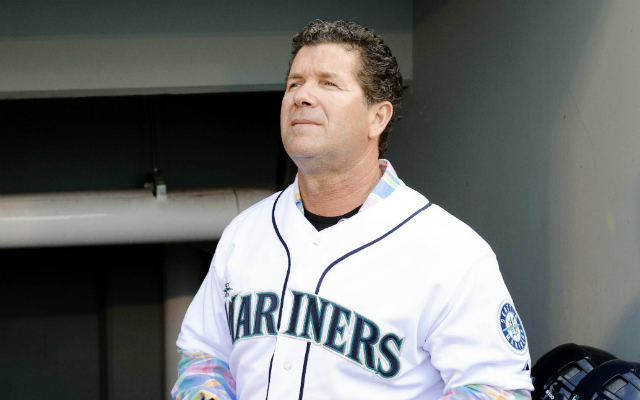
Just missed:
9. Billy Wagner. His lifetime WHIP (0.998) was actually slightly better than Rivera's. And there's also a lot to admire here. He's a little guy who did it naturally and against all odds. (This doesn't affect things, but he was an all-time great quote, too.) Close. One more year might actually have done the trick, considering he had a 1.43 ERA and 0.86 WHIP in his final campaign. Prediction: 15 percent.
10. Jim Edmonds. The numbers show what a great hitter he was, and we all recall what an amazing defender he was, as well. He may have been overlooked playing with Albert Pujols. Closer than you think. I fear he and some others will get knocked off the ballot way earlier than they should by the silly 5 percent rule, which prematurely eliminated Lou Whitaker, Carlos Delgado, Bernie Williams, Bobby Grich and many, many more stars who deserved a second (and third) look. Prediction: 9 percent.
11. Edgar Martinez. Let me say right out front the reason Martinez has been below 30 percent has nothing to do with some weirdo anti-DH bias, as his supporters suggest. I enthusiastically supported Frank Thomas, who was a DH half the time and a pretty terrible first baseman the other half of the time (and he certainly didn't get in because he masqueraded as a first baseman on occasion). There's no question Martinez was one of the best hitters of his generation, and almost the only one who consistently hit Mariano Rivera -- no small thing. There's certainly no rule or even bias against DHs here, but a DH needs either more big moments (only two top-10 MVP years, and his 1.01 MVP shares is good for only 247th all-time, according to Baseball Reference) or more raw numbers (309 career homers). No offense, but Moises Alou, who lasted only a year on the ballot, had a career that was about as great. Of course, it's fair to say Martinez may have suffered some by being overlooked as the second-best position player in Seattle -- not to mention Seattle management's mistake in needlessly delaying his promotion to the majors. But on the achievements, he misses here. Prediction: 38 percent.
12. Lee Smith. A consistently excellent closer. If someone tells me he's a Hall of Famer, I can't argue against too strenuously. Consistency was his calling card, with 25 to 47 saves every year from 1983 to '95. He got to 50 percent but has since faded. It's always been a close "no" here. Prediction: 28 percent.
13. Larry Walker. An exceptional all-around talent, who like Martinez had a terrific .300/.400/.500 slash line. But he benefited from Coors (nine-and-a-half of his 17 seasons were played in Colorado) and didn't stay healthy often or enough play quite long enough. Prediction: 16 percent.
14. Jeff Kent. One of the best hitting second basemen ever, he was a worthy protector for Bonds at one time. And I do like the slugging percentage of exactly .500 in both the regular season and postseason. Yet another borderline case. Prediction: 15 percent.
15. Nomar Garciaparra. He probably comes closer for me than most since he was brilliant at his peak (.372 in 2000 and a .313 career mark), though even I'd still say he probably needed a few more good years. Another I hope doesn't drop off the ballot. Prediction: 4 percent.
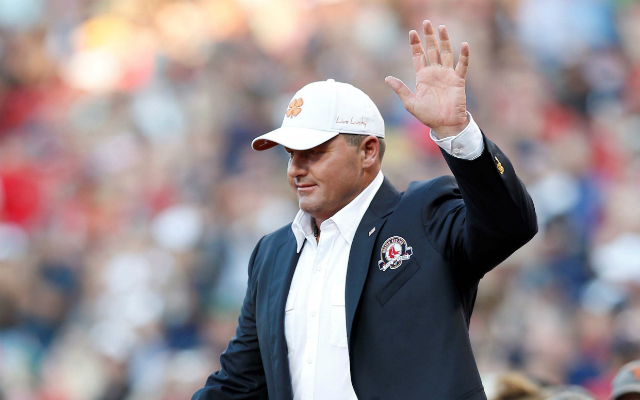
Still under consideration:
16. Roger Clemens. Many will say he and Bonds go together as the best hitter and arguably best pitcher of a generation (as case could be made for Greg Maddux there, I think). I get that, and Clemens may well get my vote next year. But his story isn't even as warm and fuzzy as Bonds, if that's even possible, in my estimation. While Bonds either clammed up or parsed words, Clemens went on "60 Minutes" and went before Congress to tell out-and-out lies. That takes a special kind of integrity issue. Perhaps more to the point, while I believe Bonds' story, I find it hard to believe anything about Clemens, who tried to ruin his old trainer Brian McNamee, who had little choice but to tell the truth once the feds came, the same truth he told about Andy Pettitte and Chuck Knoblauch. Maybe Clemens started in mid-career in Toronto, and maybe his true story is similar to Bonds'. But with him, who knows? Prediction: 48 percent.
17. Mike Piazza. He should be considered an all-time great -- he's the greatest-hitting catcher ever and the value of having a catcher who's one of the league's best hitters is immense -- but he's had to wait a few years surely due to a strongly-held belief he participated in the steroid era. I understand there's no public evidence he did anything more than play in the steroid era and looked the part. However, since this isn't a court of law, the burden of proof is much lower and since it's only about who is honored, and not who is punished, I held out for now. He rose to just under 70 percent last year, but the elimination of much of the old guard will likely have the unintended consequence of pushing Piazza into the Hall. Early polling, while unscientific, suggests he will make it easily. I certainly understand that, too. Prediction: 81 percent. (elected)
18. Mark McGwire. He's clearly a Hall of Famer on his achievements (saving baseball is a pretty good thing) and he was pretty good before he started using, though his best work and the sport-saving stuff was done with artificial aid. Prediction: 11 percent.
19. Sammy Sosa. Three times he topped 60 home runs, and he averaged 51 home runs over an eight-year span (1996-03). In a way he's really not all that different than Piazza and Jeff Bagwell, as there's no confession, no failed test, no hard evidence -- though there was a report he failed the 2003 steroid test, the corked bat and having the misfortune of being called before Congress (where he seemed to suddenly suffer diminished language skills). Prediction: 5 percent.
20. Jeff Bagwell. An excellent all-around player, he falls into the same category as Piazza (though on merits, Piazza is more clearly a Hall of Famer, at least from here). Prediction: 66 percent.
21. Gary Sheffield. His achievements make him a borderline Hall of Fame candidate, but he showed up in the Mitchell Report sending cash to Conte. There's no good explanation for that. Give him this, no one was better at forcing his way out of situations (Milwaukee, where he didn't like the town; Los Angeles, where he didn't like his contract) or making sure he stayed when he was on the trading block (Yankees, where he acted up after reports surfaced he was on the trading block). Even taking away the negative-2.2 WAR in Milwaukee where he was reported to have thrown balls away on purpose, his lifetime defensive WAR of negative-26.4 is pretty remarkable. Prediction: 13 percent.
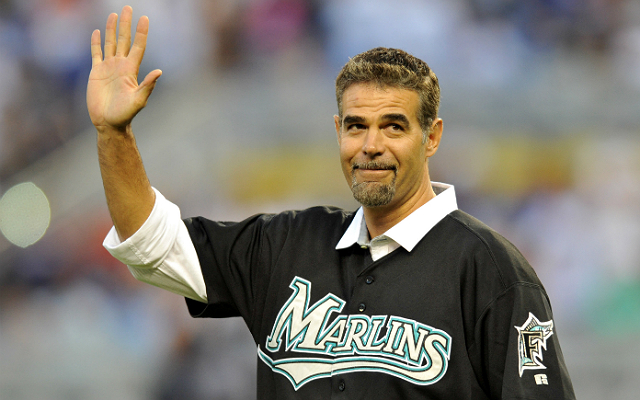
Very good players (but not Hall of Famers):
22. Mike Lowell. He was a big part of two World Series championships, and the lifetime .805 OPS suggests he was pretty darned good. (Disclaimer: a colleague at MLB Network.) Prediction: 3 votes.
23. Troy Glaus. He had big power, as the .847 career OPS attests. Through ages 27 to 32, the Baseball Reference comp was Mike Schmidt. But he was done by 33. Prediction: 0 votes.
24. Mike Sweeney. Very good hitter, very nice man. Made five All-Star Games in six years for some bad Royals teams. Prediction: 1 vote.
25. Jason Kendall. A terrific hitter for a catcher. Five times he had at least .319 with some very bad Pirates teams. Prediction: 3 votes.
26. Garret Anderson. Terrific, underrated offensive player. Had 522 doubles and a .293 career batting average. Prediction: 2 votes.
27. Luis Castillo. Long before he dropped that popup he was a pretty fair two-way player with a knack for hitting streaks. He was eight times a .300 hitter who finished with 370 stolen bases, and if he really did this at 145 pounds, as he's listed on Baseball Reference, that's even more impressive. Prediction: 0 votes.
28. Mike Hampton. He had one great early year, signed a big contract and became an excellent hitter. Like the 5.41 ERA and .582 slugging percentage his first year in Colorado, which he liked for the schools but not the atmosphere. Prediction: 1 vote.
29. David Eckstein. He overcame long odds to help two different teams win championships. Amazing. Prediction: 2 votes.
30. Brad Ausmus. He caught 18 years in the big leagues (his 1,938 games behind the dish is seventh most all-time) and came out of it without a seeming scratch, no small achievement. Prediction: 2 votes.
31. Randy Winn. A very nice complementary player. Was once traded for Lou Piniella, who's a better Hall candidate. Prediction: 0 votes.
32. Mark Grudzielanek. Pretty good hitter for a second baseman. Was a .300 hitter four times. In 1997, he had 54 doubles and a .690 OPS (81 OPS+), which is practically impossible. Prediction: 0 votes.













